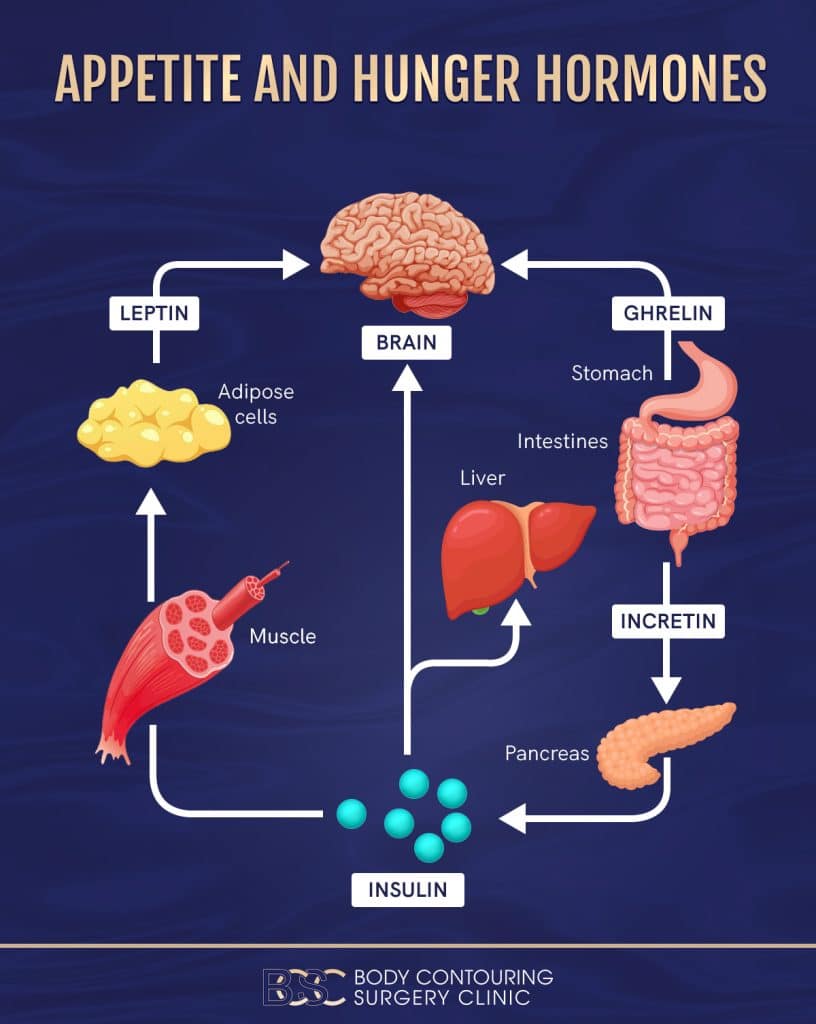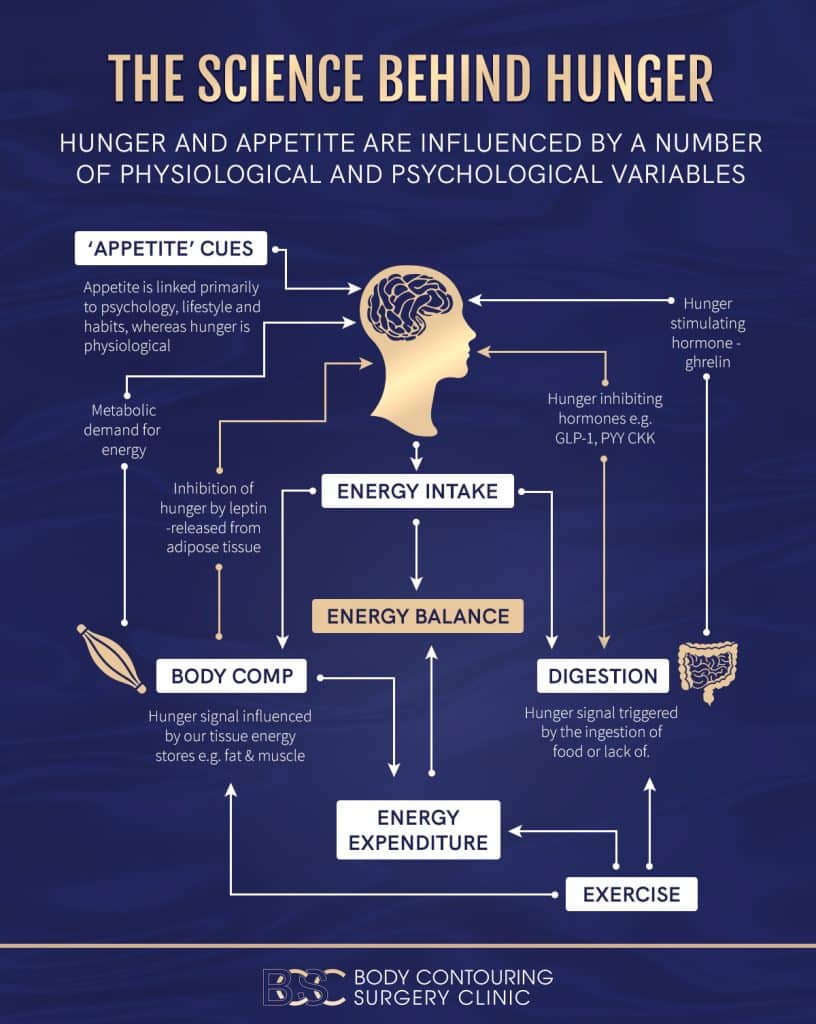
Losing weight can feel like an uphill battle. This struggle is not just due to a lack of effort or willpower. Key factors include biological mechanisms, psychological barriers, and environmental influences. Understanding “why is it so hard to lose weight” will help you identify effective strategies to overcome these challenges.
Key Takeaways
- Weight loss surgery offers a long-term solution for individuals struggling with conventional weight loss methods.
- Biological mechanisms, such as metabolic adaptation and hormonal changes, present significant challenges to weight loss by slowing metabolism and increasing hunger, making it harder to maintain a reduced calorie intake.
- Environmental, psychological, and lifestyle factors, including access to processed foods, sedentary behaviour, emotional eating, unrealistic expectations, and inadequate sleep, significantly impact weight loss efforts and require comprehensive strategies for sustained weight management.
Body contouring surgery clinic provides weight loss surgery to help

Many are all too familiar with the difficulty of losing weight. For those who struggle through conventional means, weight loss surgery presents a viable solution. This method has been proven to deliver predictable and substantial results, particularly benefitting those who have:
- grappled with other technique
- a high body mass index (BMI)
- obesity-related health conditions
- a history of unsuccessful weight loss attempts
Weight loss surgery can provide a long-term solution for those struggling with weight loss.
At the Body Contouring Surgery Clinic (BCSC), located in Maitland, Australia, we offer a wide range of services to assist in weight loss and body contouring. Our expertise lies not only in weight loss surgery but also in body contouring surgeries. Our services aim to guide overweight and obese adults towards achieving their health objectives and fostering a healthier lifestyle.
Body contouring surgery is instrumental in maintaining weight loss by tackling excess skin and the overall body silhouette. Even modest weight loss can lead to significant health benefits, and our comprehensive approach ensures that patients receive the support they need for sustainable weight loss success.
The Biological Mechanisms Behind Weight Loss

Comprehending the biological mechanisms that govern weight loss can illuminate the reasons behind the struggle many face in shedding extra kilograms. As you lose weight, your body’s metabolism slows down, a process known as metabolic adaptation, which makes further weight loss more difficult. Additionally, hormonal changes can significantly affect hunger and satiety, making it harder to maintain a reduced calorie intake.
These biological challenges, including metabolic adaptation and hormonal changes, are significant hurdles in the weight loss journey. In the following subsections, we will delve deeper into how these mechanisms work and what you can do to mitigate their effects.
Metabolic Adaptation
Metabolic adaptation occurs when the body’s metabolism slows down in response to weight loss. Essentially, this means that a smaller body burns fewer calories, making it harder to lose more weight. This reduction in metabolism is a natural defence mechanism designed to prevent starvation but can be a significant obstacle for those trying to lose weight.
This metabolic slowdown means that even with continued exercise and a healthy diet, your body’s caloric needs decrease, making achieving a negative energy balance more difficult. Understanding this process is crucial for creating a realistic and effective weight loss plan that considers these biological mechanisms.


Hormonal Changes
Hormonal changes during weight loss can also pose significant challenges. Hormones like leptin and ghrelin play crucial roles in regulating hunger and satiety. When you lose weight, these hormones can become imbalanced, leading to increased hunger and a stronger drive to eat. This can make maintaining a reduced calorie intake particularly challenging.
Leptin, responsible for signalling satiety, frequently reduces with weight loss, while ghrelin, an appetite stimulant, increases. These changes can create a constant feeling of hunger that is hard to ignore. Understanding these hormonal shifts can help you develop strategies to manage increased hunger and maintain your weight loss efforts.
Join Our Free Weight Tracker Today!
Easily track your weight and measurements, and visualize your progress with charts and photos. Sign up for personalized support from our expert team! Start your journey now!
Environmental Factors Affecting Weight Loss
Environmental factors wield a substantial influence on weight gain and loss. Our surroundings can either support or hinder our weight loss efforts. For instance, ** access to processed foods and a sedentary lifestyle are two major contributors to the obesity epidemic. Understanding these factors can help you make more informed choices and create an environment that supports your weight loss goals.
In the following subsections, we will explore:
- How the availability of processed foods affects our ability to lose weight
- How sedentary lifestyles affect our ability to lose weight
- What steps you can take to counteract these influences
** Access to Processed Foods
Processed foods pervade our modern food landscape, with ubiquity from supermarkets to convenience stores. These foods are designed to be highly palatable, with high amounts of sugar, fats, and artificial ingredients that make them calorie-dense and hard to resist. The convenience and taste of processed foods often lead to overeating, hindering weight loss efforts.
The constant presence of processed foods in vending machines, fast-food outlets, and even at home makes it challenging to stick to a ** eating plan. Being aware of this and making a conscious effort to choose whole, unprocessed foods can significantly ** your chances of weight loss success.
Sedentary Lifestyle
Modern lifestyles frequently entail extended periods of sitting, attributable to desk jobs, entertainment avenues like television and video games, or a general decrease in manual labour. This sedentary behaviour lowers the number of calories burned during the day, contributing to weight gain and making weight loss harder.
Incorporating physical activity into your daily routine, such as walking, cycling, or regular exercise routines, can counteract the effects of a sedentary lifestyle. Physical activity not only helps burn calories but also ** overall health and well-being, making it an essential component of any weight loss plan.
Psychological Barriers to Losing Weight
While frequently overlooked, psychological barriers can considerably impede weight loss efforts. Emotional eating and unrealistic expectations are two common psychological challenges that many people face. ** these barriers is crucial for achieving long-term weight loss success.
In the following subsections, we will explore how emotional eating and unrealistic expectations affect weight loss and provide strategies to overcome these obstacles.

Emotional Eating
Depression, a common mental health issue, can result in changes in appetite, reduced motivation, and lethargy. These factors can make weight loss efforts particularly difficult. Emotional eating typically manifests as the consumption of copious amounts of food in response to stress, sadness, or boredom, superseding hunger.
Practicing mindful eating can help combat emotional eating. Here are some tips to get started:
- Eat without distractions – turn off the TV, put away your phone, and focus on your meal.
- Savour each bite – take the time to really taste and enjoy your food.
- Listen to your body’s natural signals of fullness—stop eating when you feel satisfied, not when you’re stuffed. By being more aware of what and why you eat, you can better control your food intake and support your weight loss efforts.
Unrealistic Expectations
Unrealistic weight loss objectives can cultivate disappointment and wane motivation if swift weight loss milestones elude achievement. Many people expect to lose weight ** and become discouraged when progress slows or plateaus.
It is essential to set realistic weight loss goals to achieve long-term success and prevent weight regain. The recommended rate of weight loss for sustainable results is 0.5 to 1 kilogram per week. Understanding that weight loss is a gradual process can help you stay motivated and committed to your goals.

Medical Conditions and Medications
Specific medical conditions and medications can disrupt weight loss attempts by instigating hormonal imbalances, metabolic complications, or an augmented appetite. These factors can make it significantly harder to lose weight and maintain weight loss.
In the following subsections, we will explore common medical conditions and the impact of medications on weight loss.
Common Medical Conditions
Medical conditions such as hypothyroidism and polycystic ovary syndrome (PCOS) may lead to weight gain or make weight loss challenging. These conditions often involve hormonal imbalances that affect metabolism and appetite.
Metabolic diseases, such as Cushing’s disease, diabetes, and digestive and kidney diseases, can also interfere with weight loss efforts. Understanding these conditions and working with healthcare professionals to manage them is crucial for effective weight management.
Impact of Medications
Certain medications can make weight loss harder or cause weight gain by interfering with appetite and metabolism. If you are taking medications that affect your weight, it is important to discuss alternatives or strategies with your healthcare provider.
Importance of Physical Activity

Physical activity constitutes an integral part of any weight loss strategy. While exercise alone is not enough to lose weight, it plays a significant role in maintaining weight loss and overall health. Combining a healthy diet with regular physical activity maximizes the effectiveness of weight loss efforts.
In the following subsections, we will explore the importance of combining diet and exercise and the role of strength training in weight management.
Combining Diet and Exercise
Diet and exercise work synergistically to create a caloric deficit while optimizing overall health. Controlling caloric intake through a healthy diet directly affects the body’s energy balance, while exercise increases energy expenditure and helps maintain muscle mass.
Combining a nutritious diet with regular physical activity is crucial for maximizing weight loss efforts and maintaining long-term results. This balanced approach helps ensure sustainable weight loss and overall well-being.
Role of Strength Training
Strength training is crucial for weight loss because it:
- Preserves muscle mass
- Boosts metabolism
- Makes it easier to lose weight
- Helps burn more calories at rest compared to fat
Maintaining muscle mass is essential for effective weight management.
Strength training offers dual benefits during weight loss: it prevents muscle breakdown and boosts metabolism, aiding in long-term weight management. Including resistance training in your routine can significantly ** your weight loss efforts.
Dietary Challenges in Weight Loss
Dietary hurdles, like overeating and dependency on processed foods, can impede weight loss endeavors and longevity of success. ** these challenges is crucial for achieving and maintaining a healthy weight.
In the following subsections, we will explore how overeating and portion control, and the importance of whole foods affect weight loss.
Overeating and Portion Control
Overeating often results from large portion sizes, which can lead to consuming more calories than the body needs, thus preventing weight loss. When portions are too large, it becomes easy to exceed the calorie intake necessary for weight loss, leading to a weight loss plateau or even weight gain.
Low protein intake can also stall weight loss efforts. Ensuring a balanced diet with adequate protein can help control portions and reduce hunger, making it easier to maintain a caloric deficit.
Practicing portion control and focusing on nutrient-dense foods are essential strategies for successful weight management, as evidenced by the success stories from the National Weight Control Registry.
Importance of Whole Foods
Dependency on processed foods can make it hard to lose weight, as these foods are often high in calories, sugar, and unhealthy fats, making weight loss challenging. Reliance on processed foods due to busyness or stress can further complicate weight management, especially after the age of 30.
Incorporating whole foods into your diet can significantly ** your weight loss efforts. Some examples of whole foods include:
- Vegetables
- Fruits
- Lean proteins
- Whole grains
These foods provide essential nutrients and help keep you full longer. This shift towards a ** eating plan can lead to a more sustainable weight loss journey.
The Role of Sleep in Weight Management
Sleep holds paramount importance in weight management. Inadequate sleep can:
- Disrupt hunger-regulating hormones
- Increase fatigue
- Impair decision-making
- Reduce motivation
This can create a vicious cycle where increased cravings and reduced physical activity make weight management significantly more challenging.
Proper sleep duration is essential for maintaining overall health and aiding in weight management. In the following subsections, we will explore the effects of sleep deprivation and the recommended sleep duration for adults.
Effects of Sleep Deprivation
Lack of sleep can have several negative effects on your health and well-being. Here are some ways that sleep deprivation can impact your body:
- Increases cravings due to heightened levels of the hormone ghrelin, which stimulates appetite
- Leads to decreased physical activity because it causes fatigue and lack of energy
- Impairs decision-making skills by affecting the brain’s prefrontal cortex, making it harder to resist unhealthy foods
It’s important to prioritize getting enough sleep to maintain a healthy lifestyle.
Overall, lack of sleep creates a vicious cycle where increased cravings, reduced physical activity, and impaired decision-making make weight management significantly more challenging. Ensuring you get enough sleep is a crucial component of any weight loss plan.
Recommended Sleep Duration
The ideal amount of sleep for adults is 7–8 hours a night. Proper sleep duration is crucial for maintaining overall health and aiding in weight management.
Prioritizing sleep can ** your ability to manage your weight and ** your overall well-being.
Maintaining Weight Loss
Sustaining weight loss necessitates enduring lifestyle modifications, conscious eating, and consistent progress monitoring. Mindful eating helps maintain weight loss by encouraging awareness of hunger and fullness cues, reducing overeating. Keeping a diary can aid in maintaining weight loss by tracking food intake, physical activity, and emotional triggers.
In the following subsections, we will explore the importance of sustainable lifestyle changes and monitoring progress for weight loss maintenance.
Sustainable Lifestyle Changes
Successful weight loss emphasizes sustainable lifestyle changes rather than short-term diets. Incorporating healthy eating habits and regular physical activity into your daily routine can help you lose excess weight and maintain your results in the long term.
Monitoring Progress
Keeping track of food intake aids in weight loss by helping people consistently lose more weight. Here are some ways to track your food intake:
- Eat mindfully and pay attention to portion sizes
- Keep a food diary to track how much you eat per meal
- Use a food tracking app or website to log your meals and snacks
In addition to tracking your food intake, regular tracking of body weight is crucial for maintaining weight loss. It provides consistent feedback and helps identify fluctuations early.
Monitoring waist circumference can be a useful indicator of changes in body fat distribution, complementing regular weight tracking. This comprehensive approach to monitoring progress can help you stay on track with your weight loss goals.
A final word
In conclusion, losing weight is a complex process influenced by various factors, including biological mechanisms, environmental influences, psychological barriers, medical conditions, and lifestyle choices. Understanding these challenges is the first step towards overcoming them.
By ** these factors and implementing the strategies discussed in this post, you can ** your chances of weight loss success. Remember, sustainable weight loss requires a balanced approach, patience, and a commitment to long-term lifestyle changes. Stay motivated and keep pushing forward on your journey to a healthier life.
Frequently Asked Questions
Losing weight is difficult due to biological mechanisms, environmental factors, psychological barriers, medical conditions, and lifestyle choices. It’s a multifaceted challenge that requires ** various aspects of our lives.
Metabolic adaptation can slow down your metabolism as you lose weight, making it harder to continue losing weight because your body requires fewer calories for maintenance. This can impact weight loss efforts significantly.
Processed foods are often high in calories, sugar, and unhealthy fats, which can make it challenging to maintain a caloric deficit for weight loss. To support weight loss goals, it’s best to limit your consumption of processed foods.
Emotional eating can lead to overeating and hinder weight loss because it involves consuming food in response to emotions rather than hunger.
For weight management, it’s ideal to get 7-8 hours of sleep each night as it’s crucial for maintaining overall health and aiding in weight management.